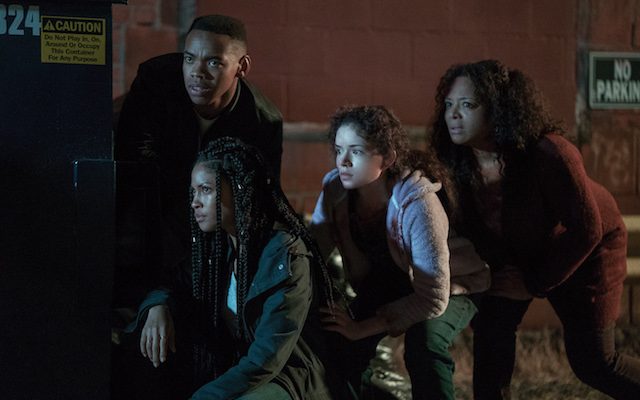
The question we had when “The Purge” came out in 2013 was: Wait, how does this work? In this near-future version of America, there’s a 12-hour period set aside each year during which all crime is legal. The result of this planned anarchy is that overall crime rates are low — people are waiting till Purge Night to indulge their angry, violent impulses, and mostly behaving themselves the other 364.5 days.
But that was never a satisfying explanation for how the Purge came to be. The logic of it — If we let people do whatever they want for one night a year, they’ll obey the law the rest of the time — is too tenuous, and it seems just as likely to have the opposite effect. (Once you get a taste for killing….) It always seemed to me that writer-director James DeMonaco had his premise of “once a year crime is legal for 12 hours,” worked backward to find a reason for it, and never come up with a good one.
So the notion of a prequel was (for once!) promising. Won’t it be interesting to see the political process that led to the Purge, to see voters and lawmakers being won over to the idea, and then to see how it goes the first time they try it? But “The First Purge” squanders the opportunity. It begins with the proposal already accepted, the logic of it never explained any better than in the previous films even though there’s a social scientist (Marisa Tomei, somehow) whose only role in the story is to provide that explanation.
The first Purge is an “experiment” to see if Dr. Marisa Tomei’s gobbledegook idea will catch on, and if it does, to see if it has the desired effect on crime rates. It’s only taking place on Staten Island, and America’s controlling political party, the New Founding Fathers of America — think Tea Party but more fascist and better organized — is paying residents $5,000 apiece to stay on the island (rather than flee for the night), more if they actually do some Purging (rather than stay indoors). It seems shady to artificially goose the number of participants when the whole point of the experiment is to see how many people will participate, but the bribery is widely reported (about 25% of the film is badly written TV news pieces) and nobody has a problem with it. Later, though, when there’s not as much mayhem as Dr. Tomei predicted and the NFFA sends in militias to stir up trouble, suddenly THAT’S unethical.
Anyway, the result is that it’s mostly poor people and minorities experiencing the Purge (either by participating or barricading their doors against it), which is what the NFFA — represented by wormy Chief of Staff Arlo Sabian (Patch Darragh) — wanted in the first place.
We meet a handful of principals who will be our main characters: Dmitri (Y’lan Noel), a successful drug dealer in the housing projects; Nya (Lex Scott Davis), his law-abiding ex-girlfriend; and Nya’s teenage brother Isaiah (Joivan Wade), who’s recently dropped out of school to work a corner for Dmitri. Isaiah, slashed by a junkie called Skeletor (Rotimi Paul), wants to use the Purge to get revenge, but Dmitri warns his crew not to take part lest they be distracted and overtaken by a rival gang during the chaos.
And then … and then nothing. DeMonaco handed the directorial reins to Gerard McMurray this time, but his screenplay is like the other three, bringing up interesting socio-political ideas and then failing to comment on them meaningfully. It’s a movie with Big Ideas where the ideas never got past the preliminary stage.
Which would be fine, I guess, if what we got instead were thrilling or scary or something. But except for Skeletor, who kills randomly, and apart from a few scattered pranksters and perverts, nothing about the night is terrifying until the big guns show up and it turns into a “Die Hard” (or “Attack the Block”) scenario. The finale is lively, but it has little to do with the film’s ostensible themes. The dialogue and acting tend to be cheesy but not quite campy — the movie is stuck in the awkward middle ground between legitimacy and nonsense.
There’s one isolated, insane moment where some white police officers beat up a black man on a baseball field while “America the Beautiful” plays. The moment is blunt and not really substantive as commentary — but it’s audacious and memorable. If “The First Purge” wasn’t going to be an effective thriller, it could have saved face by committing more fully to that level of brazen satire.
C+ (1 hr., 38 min.; )





